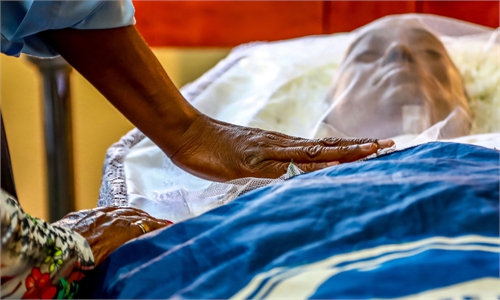New demonstrations against racism took place on Sunday outside Carrefour supermarkets in Brazil to protest the death of a black man beaten to death by white guards at a Porto Alegre store branch.
A video taken Thursday night in the southern city showed 40-year-old welder Joao Alberto Silveira Freitas repeatedly being punched in the face and head by a security guard while he is being restrained by another at a Carrefour market.
The clip quickly went viral on social media, and triggered a first round of demonstrations on Friday as the country marked Black Consciousness Day.
More protests were held on Saturday, when Silveira Freitas was buried.
In Rio de Janeiro on Sunday, around 100 protesters gathered at a shopping center where one of the French group's supermarkets is located, AFP journalists reported.
Other protests drew several dozen people demanding a boycott of Carrefour in various parts of the country, such as Salvador de Bahia or Santos.
Rio protesters carried banners reading "Murderous Carrefour" and "Black Lives Matter," using the slogan prominent in the US during demonstrations against recent police killings of minorities.
In a series of tweets in Portuguese on Friday, Carrefour CEO Alexandre Bompard expressed his condolences over the "horrible act" and said that the images were "unbearable."
He also ordered "a complete review of training for employees and outsourced personnel in matters of safety, respect for diversity" and "rejection of intolerance."
Djefferson Amadeus of the Institute for the Defense of Black People, who was demonstrating on Sunday in Rio, however said "we no longer accept those apologies. They have promised us measures, but so far we have not seen anything."
Other protesters echoed his concerns.
"We are not going to shut up while they continue to kill our people," said Thais dos Santos, 23.
"This shows that racism is still very present in Brazil, not only in the supermarket, but also in the favelas."
A video taken Thursday night in the southern city showed 40-year-old welder Joao Alberto Silveira Freitas repeatedly being punched in the face and head by a security guard while he is being restrained by another at a Carrefour market.
The clip quickly went viral on social media, and triggered a first round of demonstrations on Friday as the country marked Black Consciousness Day.
More protests were held on Saturday, when Silveira Freitas was buried.
In Rio de Janeiro on Sunday, around 100 protesters gathered at a shopping center where one of the French group's supermarkets is located, AFP journalists reported.
Other protests drew several dozen people demanding a boycott of Carrefour in various parts of the country, such as Salvador de Bahia or Santos.
Rio protesters carried banners reading "Murderous Carrefour" and "Black Lives Matter," using the slogan prominent in the US during demonstrations against recent police killings of minorities.
In a series of tweets in Portuguese on Friday, Carrefour CEO Alexandre Bompard expressed his condolences over the "horrible act" and said that the images were "unbearable."
He also ordered "a complete review of training for employees and outsourced personnel in matters of safety, respect for diversity" and "rejection of intolerance."
Djefferson Amadeus of the Institute for the Defense of Black People, who was demonstrating on Sunday in Rio, however said "we no longer accept those apologies. They have promised us measures, but so far we have not seen anything."
Other protesters echoed his concerns.
"We are not going to shut up while they continue to kill our people," said Thais dos Santos, 23.
"This shows that racism is still very present in Brazil, not only in the supermarket, but also in the favelas."

